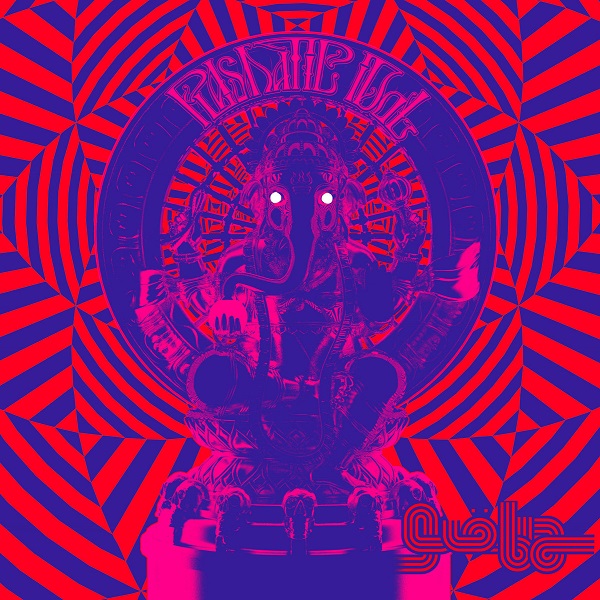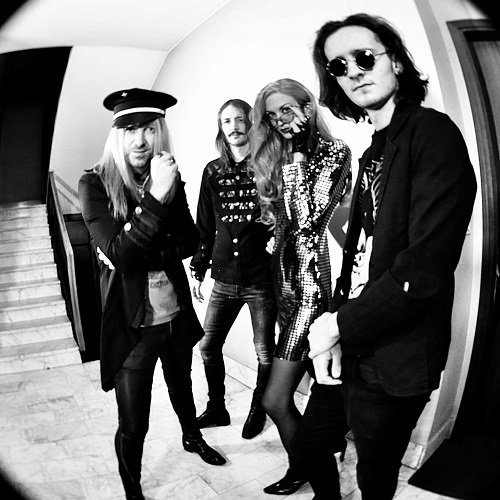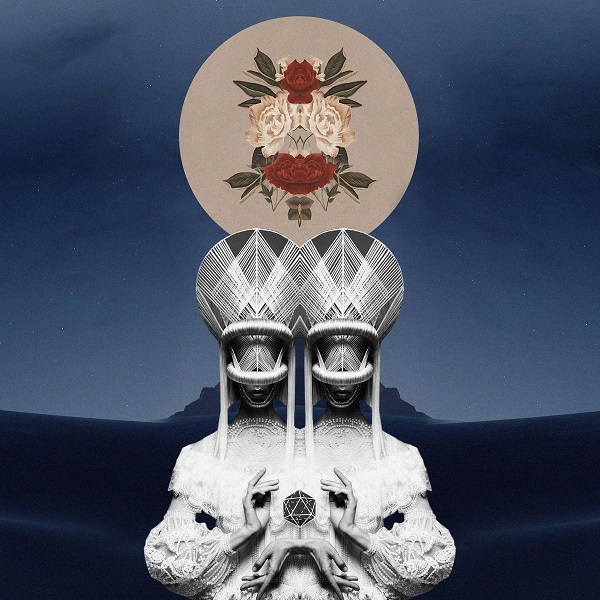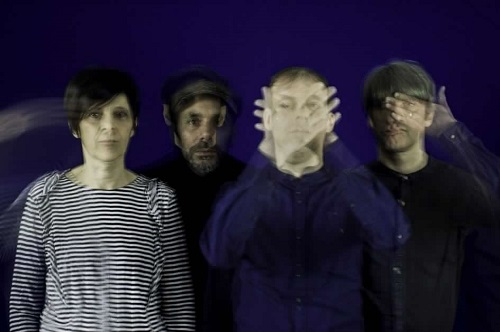Ultimo sguardo di Plenirockium del 2020 dedicato a due gruppi italiani sui riflessi di ascolti impressivi colti durante l’anno anche nel proposito di offrire una prospettiva che in questi sette mesi di ripartenza del blog è stata poco raccontata.
Giöbia
“Plasmatic Idol”
Heavy Psych Sounds (LP + CD)
A Milano risiede l’osservatorio astronomico dei Giöbia. Stefano Bazu Basurto (chitarra, voce), Paolo Detrij Basurto (basso), Pietro D’Ambrosio (batteria) e  Melissa Crema (tastiere, voce) sono scienziati spacerockers le cui ricerche hanno prodotto una discografia estesa lungo un percorso iniziato nei primi anni 2000. Una space odyssey prodotta con grande maestria anche nel destreggiarsi in un vasto apparato strumentale acustico-elettrico-elettronico tra la tecnologia analogica dei sintetizzatori, la magia di strumenti etnici (come sitar, oud e percussioni varie) e l’energia chitarristica propria nell’essenza rock. Da “Beyond the Stars” (2004, dove eseguono una fantastica cover di ‘Mathar’ del Dave Pike Set) a “Magnifier” (2015), che li ha consacrati a livello internazionale, lungo la rotta di quattro album, espressioni di moderno space rock ma anche visone artistica ampliata da stupendi artworks, inserti, vinili colorati. Un grande amore per la cultura underground da cui è nata questa multiespressività che evoca formazioni storiche come Hawkwind, Gong, Magma ed anche Il Balletto di Bronzo per planare sul grande scenario italiano degli anni 70.
Melissa Crema (tastiere, voce) sono scienziati spacerockers le cui ricerche hanno prodotto una discografia estesa lungo un percorso iniziato nei primi anni 2000. Una space odyssey prodotta con grande maestria anche nel destreggiarsi in un vasto apparato strumentale acustico-elettrico-elettronico tra la tecnologia analogica dei sintetizzatori, la magia di strumenti etnici (come sitar, oud e percussioni varie) e l’energia chitarristica propria nell’essenza rock. Da “Beyond the Stars” (2004, dove eseguono una fantastica cover di ‘Mathar’ del Dave Pike Set) a “Magnifier” (2015), che li ha consacrati a livello internazionale, lungo la rotta di quattro album, espressioni di moderno space rock ma anche visone artistica ampliata da stupendi artworks, inserti, vinili colorati. Un grande amore per la cultura underground da cui è nata questa multiespressività che evoca formazioni storiche come Hawkwind, Gong, Magma ed anche Il Balletto di Bronzo per planare sul grande scenario italiano degli anni 70.
Nel percorso evolutivo del gruppo aderiscono anche potenti groove ipnotici, raggi di dub cosmico che sembrano provenire dalla  galassia Ozric Tentacles. Una massa ritmica che eleva la densità Giöbia e risplende in anni recenti nel bellissimo “Live Freak” (2017) registrato al Freak Valley Festival di Netphen (Germania) e nel side project La Morte Viene Dallo Spazio con “Sky Over Giza” (2018) escursione sperimentale ambient psichedelica di grande suggestione sulle tracce di Nik Turner, ultimo visitatore che con un flauto (e l’album “Xitintoday”) era entrato nella grande piramide (altre tracce hawkwindiane nella cover di ‘Silver Machine’ B side di un singolo del 2017).
galassia Ozric Tentacles. Una massa ritmica che eleva la densità Giöbia e risplende in anni recenti nel bellissimo “Live Freak” (2017) registrato al Freak Valley Festival di Netphen (Germania) e nel side project La Morte Viene Dallo Spazio con “Sky Over Giza” (2018) escursione sperimentale ambient psichedelica di grande suggestione sulle tracce di Nik Turner, ultimo visitatore che con un flauto (e l’album “Xitintoday”) era entrato nella grande piramide (altre tracce hawkwindiane nella cover di ‘Silver Machine’ B side di un singolo del 2017).
Il qui ed ora è “Plasmatic Idol” uscito all’inizio del 2020, sesto album, notevole conferma di un suono che espande con carattere distintivo anche nel presentarsi avvolto dall’ennesimo spettacolare artwork. I toni space si amalgamano alla psichedelia per fluire potenti in ‘Hardiwar’, ‘In the Dawnlight’ e ‘Heart of Stone’ (brano realizzato anche come singolo affacciato all’inedita cover sitar-beat-garage di ‘Handle Song’ dei Soledad Brothers). Atmosfere più rock oriented ma sempre in arrivo dalle stelle dove risonanze, glissando, soffi elettronici captano le trasmissioni extrasolari di ‘Plasmatic Idol’,‘ Parahelion’, ‘Fire Escape’ e ‘Far Behind’. Un contributo di grande vitalità artistica alla corrente spacerock planetaria e al piacere uditivo di ogni appassionato che si rispetti.
Muni
“Soma”
Backwards Records (LP)
Da Milano al territorio dell’Emilia il passo è breve anche nel connotare un’altra comunità creativa di rilievo nel panorama  musicale italiano da oltre vent’anni. Parliamo dei Julie’s Haircut e della loro vasta discografia che a partire dalla fine degli anni 90 ha scritto pagine memorabili di un racconto che elabora tratti nascenti postpunk – postrock con sviluppi funzionali in un divenire ispirato da psichedelia, krautrock, jazz, cinema, fumetti e letteratura visionaria (percorso condiviso anche con altri musicisti tra cui Damo Suzuki e Sonic Boom). Un tesoro che ha impreziosito con gli ultimi due album, “Invocation And Ritual Dance Of My Demon Twin” (2017) e “In the Silent Electric” (2019), il catalogo Rocket Recordings per un meritato riconoscimento oltreconfine. Il linguaggio di libertà espressiva con cui questi musicisti comunicano offre anche elementi di natura trascendentale come vettore di ritualità. Una caratteristica che si intensifica con nuove splendide suggestioni nel progetto parallelo Muni ideato da Nicola Caleffi (chitarrista, polistrumentista), tra i fondatori di Julie’s Haircut.
musicale italiano da oltre vent’anni. Parliamo dei Julie’s Haircut e della loro vasta discografia che a partire dalla fine degli anni 90 ha scritto pagine memorabili di un racconto che elabora tratti nascenti postpunk – postrock con sviluppi funzionali in un divenire ispirato da psichedelia, krautrock, jazz, cinema, fumetti e letteratura visionaria (percorso condiviso anche con altri musicisti tra cui Damo Suzuki e Sonic Boom). Un tesoro che ha impreziosito con gli ultimi due album, “Invocation And Ritual Dance Of My Demon Twin” (2017) e “In the Silent Electric” (2019), il catalogo Rocket Recordings per un meritato riconoscimento oltreconfine. Il linguaggio di libertà espressiva con cui questi musicisti comunicano offre anche elementi di natura trascendentale come vettore di ritualità. Una caratteristica che si intensifica con nuove splendide suggestioni nel progetto parallelo Muni ideato da Nicola Caleffi (chitarrista, polistrumentista), tra i fondatori di Julie’s Haircut.
Il processo creativo nasce da ‘Coloro che meditano in silenzio’, uno dei significati della parola sanscrita Muni, e si sviluppa lungo una giornata di improvvisazione in studio con il coinvolgimento di Laura Storchi (basso, anche lei tra i fondatori di Julie’s Haircut) e due  componenti del gruppo psych rock Pip Carter Lighter Maker, Claudio Luppi (chitarra, voce) e Pierluigi Lanzillotta (batteria, percussioni). Questa pratica si è da poco espansa nell’album di debutto “Soma” (la bevanda sacra del culto vedico) ‘un viaggio iniziatico in profonda comunione con la natura’. E questo viaggio è una vera esperienza di ascolto nel ‘risuonare spazi e silenzi, trasformando la musica in un paesaggio immaginario’.
componenti del gruppo psych rock Pip Carter Lighter Maker, Claudio Luppi (chitarra, voce) e Pierluigi Lanzillotta (batteria, percussioni). Questa pratica si è da poco espansa nell’album di debutto “Soma” (la bevanda sacra del culto vedico) ‘un viaggio iniziatico in profonda comunione con la natura’. E questo viaggio è una vera esperienza di ascolto nel ‘risuonare spazi e silenzi, trasformando la musica in un paesaggio immaginario’.
Qualcosa anche per afferrare il maggior numero di ambientazioni, di possibilità sonore come nelle atmosfere Fourth-World di ‘Drinking At The River Of Light’. Echi jazz che sfumano in bagliori psichedelici, guidati da voci eteree, percussioni ovattate e ghirlande sax nel cosmo riverberato di ‘Spirit Animal’. Vibrazioni etno-tribali che attenuano rarefatte tra cimbali e arpeggi elettrici nell’incanto di ‘Presence By The Fire’ e accrescono nel finale fantasmagorico di ‘Corona Borealis’. Un viaggio che si imprime nella mente restando fluido, privo di confini, come luogo di transito attraversato dai venti dell’ispirazione e che Muni ‘percorre tra cielo e terra accompagnato da tre testi molto cari, che hanno partecipato durante le sessioni di studio: la Bhagavadgītā, il poema zen Shodoka di Yoka Daishi e le poesie di Dylan Thomas’.

English translation…
Plenirockium’s last gaze on 2020 dedicated to two Italian bands, on the reflections of impressive listenings seized during the year also with the aim to offer a perspective that in these seven months of the blog restarting has been little told.
Giöbia
“Plasmatic Idol”
Heavy Psych Sounds (LP + CD)
Welcome to Milan where the Giöbia astronomical observatory resides. Stefano Bazu Basurto (guitar, vocals), Paolo Detrij Basurto (bass), Pietro D’Ambrosio (drums) and Melissa Crema (keyboards, vocals) are spacerocker scientists whose research has produced an extensive discography along a path that began in the early 2000s. . A space odyssey produced with great skill also in juggling a vast acoustic-electric-electronic instrumental apparatus between the analogue technology of synthesizers, the magic of ethnic instruments (such as sitar, oud and various percussions) and the guitar energy of its own in the rock essence. From “Beyond the Stars” (2004, where they perform a fantastic cover of ‘Mathar’ by the Dave Pike Set) to “Magnifier” (2015), that has consecrated them internationally, along the route of four albums, expressions of modern space rock but also artistic vision extended by wonderful artworks, inserts, colored vinyls. A great love for underground culture from which this wide expressiveness was born, which evokes historical formations such as Hawkwind, Gong, Magma and even Il Balletto di Bronzo to glide over the great Italian scenario of the 70s.
In the evolutionary path of the band there are also powerful hypnotic grooves, cosmic dub rays that seem to come from the Ozric Tentacles galaxy. A rhythmic mass that raises Giöbia density and shines in recent years in the beautiful “Live Freak” (2017) recorded at the Freak Valley Festival in Netphen (Germany) and in the side project La Morte Viene Dallo Spazio with “Sky Over Giza” (2018) highly suggestive psychedelic ambient experimental excursion on the traces of Nik Turner, the last visitor who with a flute (and the album “Xitintoday”) had entered the great pyramid (other Hawkwindian clues in the cover of ‘Silver Machine’ B side of a single from 2017).
The here and now is “Plasmatic Idol” released at the beginning of 2020, sixth album, remarkable confirmation of a sound that expands with distinctive character even in presenting itself wrapped in yet another impressive artwork. The space tones blend with psychedelia to flow powerfully in ‘Hardiwar’, ‘In the Dawnlight’ and ‘Heart of Stone’ (a song also released as a single facing the unreleased sitar-beat-garage cover of ‘Handle Song’ by Soledad Brothers). More rock oriented atmospheres but always arriving from the stars where resonances, glissando, electronic swirls capture the extrasolar transmissions of ‘Plasmatic Idol’, ‘Parahelion’, ‘Fire Escape’ and ‘Far Behind’. A contribution of great artistic vitality to the planetary spacerock current and to the auditory pleasure of every self-respecting enthusiast.
Muni
“Soma”
Backwards Records (LP)
From Milan to the territory of Emilia, the step is short, also in connoting another important creative community in the Italian music scene for over twenty years. We are talking about Julie’s Haircut and their vast discography that since the end of the 90s has written memorable pages of a story that elaborates nascent postpunk/postrock traits with functional developments in a becoming inspired by psychedelia, krautrock, jazz, cinema, comics and visionary literature (path shared also with other musicans among which Damo Suzuki and Sonic Boom). A treasure that with the last two albums, “Invocation And Ritual Dance Of My Demon Twin” (2017) and “In the Silent Electric” (2019), has embellished the Rocket Recordings catalog for a well-deserved international recognition. The language of expressive freedom with which these musicians communicate also offers elements of a transcendental nature as a vector of rituality. A feature that intensifies with new splendid suggestions in the parallel project Muni conceived by Nicola Caleffi (guitarist, multi-instrumentalist), one of the founders of Julie’s Haircut.
The creative process arises from ‘Those who meditate in silence’, one of the meanings of the Sanskrit word ‘Muni’, and develops over a day of improvisation in the studio with the involvement of Laura Storchi (bass, also one of the founders of Julie’s Haircut) and two members of the psych rock group Pip Carter Lighter Maker, Claudio Luppi (guitar, vocals) and Pierluigi Lanzillotta (drums, percussion). This practice has recently expanded into the debut album “Soma” (the sacred drink of the Vedic cult) ‘an initiatory journey in deep communion with nature’. And this journey is a real listening experience in ‘make spaces and silences resonate, transforming music into an imaginary landscape’.
Something also to grasp the greatest number of settings, of sound possibilities as in the Fourth-World atmospheres of ‘Drinking At The River Of Light’. Jazz echoes that fade into psychedelic flashes, led by ethereal voices, muffled percussion and saxophone garlands in the reverberated cosmos of ‘Spirit Animal’. Ethno-tribal vibrations that attenuate rarefied between cymbals and electric arpeggios in the enchantment of “Presence By The Fire” and increase in the phantasmagoric ending of “Corona Borealis”. A journey that is imprinted on the mind while remaining fluid, without borders, as a transit place crossed by the winds of inspiration and that Muni ‘travel between heaven and earth accompanied by three very dear texts, which attended during the studio sessions: the Bhagavadgītā, the zen poem Shodoka by Yoka Daishi and the poems by Dylan Thomas’.